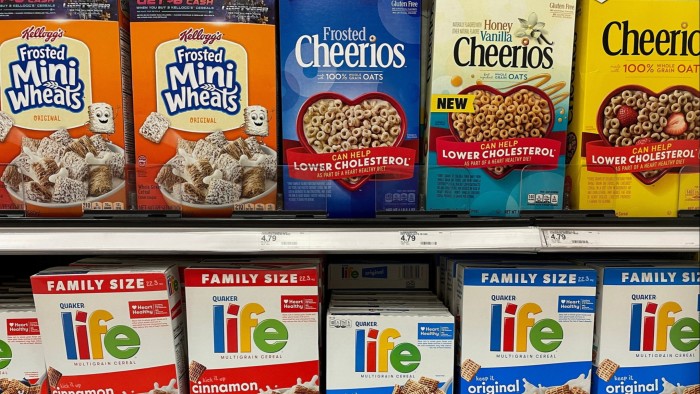Unlock the Editor’s Digest for free
Roula Khalaf, Editor of the FT, selects her favourite stories in this weekly newsletter.
Cereal is no longer the breakfast of champions. Its diminished presence in American pantries has in turn put the companies that make crunchy morning treats in a tough spot.
Consumers, led by millennials, prefer to fuel their day with smoothies, avocado toast and Instagram-friendly overnight oats. While 70 per cent of US households still eat cereal, only 12 per cent do so on a daily basis, according to a survey by CivicScience, a polling firm.
Cereal consumption has been on a slow, soggy decline. Annual sales in the US were 2.1mn tonnes back in 2008, according to Euromonitor data. A pandemic-induced surge came and went, leaving sales at just 1.6mn tonnes in 2023. They are expected to decline again this year.
Big Cereal — namely Cheerios maker General Mills and Special-K peddler WK Kellogg — has been able to sweeten falling volumes with price increases. It is also investing in its supply chain to support profitability. Shares in WK Kellogg are up 30 per cent since its split from Kellogg,
But this strategy may be running its course. Consumers, fed up with high prices, are either buying less or ditching their favourite brands altogether. Full-year sales at WK Kellogg are expected to be essentially flat compared with last year. Analyst forecasts see them creeping down further in 2025 and 2026, according to S&P Capital IQ.
That helps explain why WK Kellogg, which was spun off from what is now called Kellanova last year, trades at a hefty discount to its former parent company, which benefits from a faster-growing snack business. It is on 12 times forward earnings, compared with 21 times for Kellanova. Rival cereal makers General Mills and Post Holdings, which are more diversified, are trading on multiples of 14.5 and 18 times respectively The valuation gap between WK Kellogg and its peers underscores how hard that is to grow as a standalone cereal-focused business.
Breakfast cereal is still a $12bn-plus a year business. But running businesses in secular decline is difficult. Companies need to invest in product innovation, marketing and promotion to defend sales. Competition will only get stiffer. Fast-food giants including McDonald’s, Wendy’s, Burger King and Taco Bell are all looking to push their morning offerings. There is no shortage of rivals poised to twist the spoon.
Read the full article here

